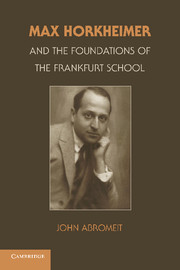Book contents
- Frontmatter
- Contents
- Acknowledgments
- A Note on References and Permissions
- Introduction
- 1 Coming of Age in Wilhelmine Germany
- 2 Student Years in Frankfurt
- 3 A Materialist Interpretation of the History of Modern Philosophy
- 4 The Beginnings of a Critical Theory of Contemporary Society
- 5 Horkheimer’s Integration of Psychoanalysis into His Theory of Contemporary Society
- 6 Horkheimer’s Concept of Materialism in the Early 1930s
- 7 The Anthropology of the Bourgeois Epoch
- 8 Reflections on Dialectical Logic in the Mid-1930s
- Excursus I The Theoretical Foundations of Horkheimer’s Split with Erich Fromm in the Late 1930s
- Excursus II Divergence, Estrangement, and Gradual Rapprochement
- 9 State Capitalism – The End of Horkheimer’s Early Critical Theory
- Epilogue
- Selected Bibliography
- Index
- References
8 - Reflections on Dialectical Logic in the Mid-1930s
Published online by Cambridge University Press: 05 June 2012
- Frontmatter
- Contents
- Acknowledgments
- A Note on References and Permissions
- Introduction
- 1 Coming of Age in Wilhelmine Germany
- 2 Student Years in Frankfurt
- 3 A Materialist Interpretation of the History of Modern Philosophy
- 4 The Beginnings of a Critical Theory of Contemporary Society
- 5 Horkheimer’s Integration of Psychoanalysis into His Theory of Contemporary Society
- 6 Horkheimer’s Concept of Materialism in the Early 1930s
- 7 The Anthropology of the Bourgeois Epoch
- 8 Reflections on Dialectical Logic in the Mid-1930s
- Excursus I The Theoretical Foundations of Horkheimer’s Split with Erich Fromm in the Late 1930s
- Excursus II Divergence, Estrangement, and Gradual Rapprochement
- 9 State Capitalism – The End of Horkheimer’s Early Critical Theory
- Epilogue
- Selected Bibliography
- Index
- References
Summary
Eine Bestimmung der philosophischen Begriffe ist immer zugleich eine Darstellung der menschlichen Gesellschaft in ihrer geschichtlich gegebenen Verfassung.
Max Horkheimer (1938)In a letter to Erich Fromm on July 20, 1934, Horkheimer mentioned that he was beginning work on a project on dialectical logic. In another, more substantial letter to Fromm nine days later, he went into some detail about his preliminary work on the project. He outlined some of the central problems he planned to address, including the difference between idealist and materialist dialectics, the role of psychology in a critical theory of history, and his critique of the abstract ego of consciousness philosophy. This attempt by Horkheimer to develop a materialist, or dialectical, logic appropriate to current historical conditions remained central to his concerns throughout the 1930s. This project on dialectical logic represented a continuation of his reflections on materialism in the early 1930s; dialectical logic became the most general philosophical concept that linked together and guided Horkheimer’s essays in the 1930s. In fact, in a letter to friend in September 1938, Horkheimer stated clearly that he viewed the essays that he had published until then in the Zeitschrift as “in truth merely preliminary studies for a larger work on a critical theory of the social sciences.” From other letters that Horkheimer sent to friends at this time, it is clear that the work in question here was the “long-planned work on dialectics” that he had intended to write at least since 1934. In September 1938, Horkheimer was traveling through North America, looking for new place to live where he could work on the project uninterrupted. He was frustrated that his activities at the Institute had prevented him from devoting his full attention to it. He had also just received news of the seriousness of the Institute’s financial crisis, which provided further impetus to scale back on Institute activities and turn his attention to the project on dialectical logic. In a letter to a friend from September 1938, Horkheimer wrote, “The necessity to find a less expensive place to live has moved us to look for a small house with a garden in the vicinity of New York. There I will finally find the necessary peace and quiet to realize my long-standing plans for a book. Mr. Marcuse should, if possible, move nearby and provide substantial help.” Horkheimer had been discussing the project from the beginning with Marcuse, as one of his letters to Fromm in July 1934 makes clear; but by 1938, his relationship with Theodor Adorno had improved considerably, such that he was also considering Adorno as a possible collaborator on the project. In a letter to Adorno in September 1938, Horkheimer told him that “my thoughts are revolving around our [work on] dialectics.” The context of the remark leaves no doubt that Horkheimer was referring to the project and alluding to the possibility of Adorno becoming his collaborator. In the end, Horkheimer chose neither a house near New York nor Marcuse as his assistant, but rather a house in Los Angeles and Adorno as his coauthor of what would eventually become Dialectic of Enlightenment.
Information
- Type
- Chapter
- Information
- Max Horkheimer and the Foundations of the Frankfurt School , pp. 301 - 335Publisher: Cambridge University PressPrint publication year: 2011
